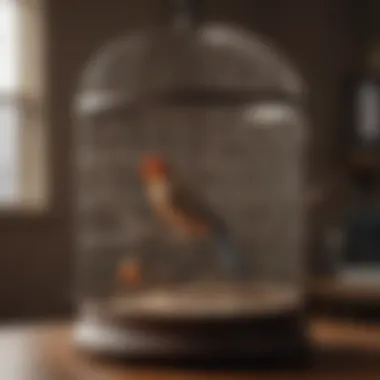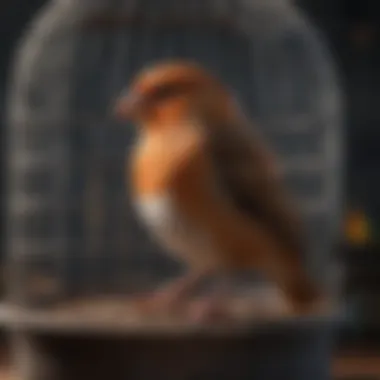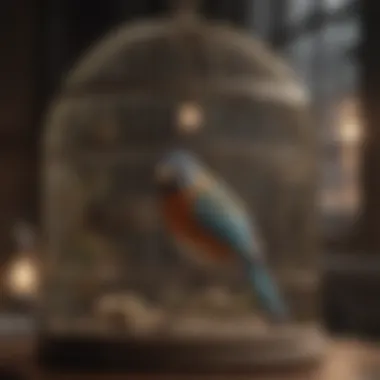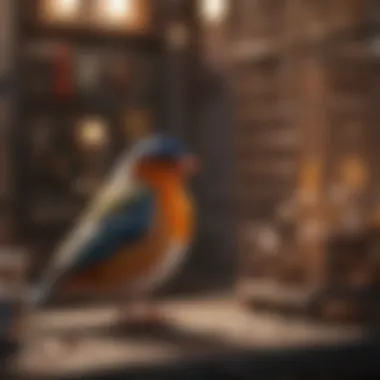Affordable Bird Cages: Quality Choices for Every Budget


Intro
Birds captivate many with their vibrant colors and melodious sounds. For the aspiring pet bird owner or current enthusiast, choosing the right cage is crucial. This guide goes beyond mere aesthetics; it aims to provide essential information on affordable bird cages while considering the well-being of your feathered companions. Understanding factors such as quality, size, materials, and design can be overwhelming. However, with the right knowledge, informed decisions can ensure happiness for both you and your bird.
Avian Care Basics
Importance of Proper Nutrition
Providing your bird with a nutritious diet is critical to its overall health. A proper diet typically consists of a balanced mix of pellets, seeds, fruits, and vegetables. Each bird species has its unique dietary requirements, making it vital to research what your pet enjoys and needs the most.
Understanding Bird Species and Their Needs
Different species have diversified needs. Parakeets, for example, thrive in spacious cages filled with climbing areas, while canaries may require smaller, more enclosed spaces for security. Understanding their behaviors and natural habitats can deepen your bond. Ensure you consider these elements while selecting an affordable bird cage.
Basics of Birds Habitat Setup
Creating a comfortable habitat involves more than just setting up a cage. It is essential to place perches strategically to allow your bird freedom of movement. Use natural branches when possible to maintain their foot health. Acclimating birds to their new environment can take time, but spacious areas will support their willingness to explore.
Grooming and Hygiene Tips
Regular grooming keeps your bird healthy and happy. Bathing should occur frequently, and feathers may require occasional trimming. Keep the cage clean to prevent bacterial growth. Learn how often to clean different areas, like perches or bowls, using safe cleaning agents for exteriors.
Interacting with Your Pet Bird
Building Trust and Connection
Establishing trust is essential to form a lasting relationship with your bird. Offering treats can encourage interaction, but patience requires more than food. Spend time in short, peaceful periods, speaking softly, and gradually gaining their comfort with your presence.
Training Techniques and Tips
Training is not just a fun activity; it stimulates your bird mentally. Simple commands such as
Understanding Bird Cage Needs
Understanding the needs of your pet bird is essential when choosing an affordable cage. Your bird’s well-being hinges on multiple variables, such as size, material, and cage design, which are critical for a healthy environment. In this discussion, each of these elements will be examined, emphasizing how to make informed choices.
Identifying Appropriate Size
The size of the cage is perhaps the most significant factor. Different bird species require different space allocations. For instance, small birds such as Budgerigars may need a cage that is not too large but offers horizontal space for them to fly. In contrast, larger birds like African Grey Parrots require ample height and width to move freely.
Considerations when Evaluating Size:
- Minimum dimensions: Always research the minimum cage size required for your specific birds.
- Vertical space: Some species prefer climbing; thus a taller cage might be beneficial.
- Flight space: Ensure the cage allows for short flights or flapping of wings.
Determining the appropriate size not only fulfills the basic needs of a bird but can also significantly improve its overall quality of life.
Assessing Material Durability
The cage material dictates not only durability but also safety. Metals like stainless steel or powder-coated iron are generally better choices than untreated wood or plastic. Birds can chew on materials, which poses health risks if they chew through toxic substances. Factors to consider include:
- Corrosion resistance: Stainless steel cages are resistant to rust and corrosion, ensuring a longer lifespan.
- Non-toxic finishes: Look for cages with bird-safe coatings or finishes to avoid potential health hazards.
- Structural integrity: Ensure materials can withstand beak-related wear and tear. Durability affects not only the longevity of the cage but also the overall safety of your pet.
A solidly built cage prevents injuries and thus offers peace of mind for bird owners.
Popular Types of Bird Cages
Understanding the variety of bird cage types is crucial for bird owners. Each type caters to distinct needs and species. Selecting the right cage enhances the bird's quality of life. It not only affects their well-being but also their behavior and activity levels. Knowing the benefits and limitations of different cages will enable owners to make an informed choice that suits both their budget and the specific requirements of their feathered companion.
Standard Bird Cages


Standard bird cages are the most common option available. They typically feature a basic rectangular shape, designed to house a variety of small to medium-sized birds. The bars are closely spaced to ensure the safety of your feathered friends while they perch or fly about. They usually come equipped with food and water trays as well as perches for relaxation.
Key Advantages:
- Affordable: Standard cages are often the most cost-effective option, fitting within the budget of most pet owners.
- Diverse Sizes: They come in a range of sizes, which makes it easier to accommodate the specific species of bird you might have.
However, these cages may not provide enough space for larger breeds or for birds that require more extensive mobility. Owners should also be aware that additional enrichments, such as toys or extra perches, may be necessary to keep birds stimulated inside a standard cage.
Flight Cages
Flight cages are specifically designed to facilitate movement. They tend to be more substantial in height and width, allowing birds more room to exercise. These cages often feature horizontal bars that provide ample perching space and encourage flying.
Advantages:
- Enhanced Exercise: Birds are more active, reducing health issues associated with confinement.
- Social Interaction: They allow for easier integration of multiple birds, nurturing social behavior necessary for certain species.
Their larger size comes at a higher cost, but for those serious about providing a healthy environment for their birds, the investment can be worthwhile.
Aviaries
Aviaries represent the largest option in the bird housing category and are generally suitable for keeping multiple birds together. This type of cage resembles a small outdoor enclosure and is often made from wood and wire. They can be placed indoors but serve a significant role when it comes to outdoor aviculture.
Distinct Benefits:
- Natural Environment: Aviaries replicate a more natural setting, enabling birds to engage in behaviors such as flying and foraging.
- Social Structures: These setups encourage the formation of natural social structures among various bird species.
The expense is among the greatest in bird aviary costs, mainly due to the space and materials needed. However, for dedicated bird owners or breeders, they present an unparalleled opportunity for a well-rounded bird-raising experience.
Aviation cages offer space and an ideal environment not typically found in smaller cages. They are conducive to healthier lifestyles for birds.
Conclusively, selecting the proper type of cage hinges on several factors, such as available space, budget, and the type of birds being cared for. Adequate consideration of these factors will provide long-term benefits for both the owner and the avian companions.
Key Features of Affordable Bird Cages
When selecting a suitable bird cage, especially on a budget, it is crucial to focus on specific features that contribute significantly to the well-being of the birds. The design and functionality of an affordable bird cage play a vital role in ensuring that our feathered companions remain healthy and content. In this section, we will explore three key elements that optimize the living environment for birds while remaining cost-effective: easy clean designs, perch placement and variety, and food and water access.
Easy Clean Designs
The convenience of maintaining a clean bird cage cannot be overstated. Easy clean designs are not just a luxury; they are a necessity for bird owners. Cages that allow for quick accessibility and removal of debris promote good hygiene and reduce stress for both owner and bird.
A cage with a bottom tray that slides out makes cleanup simple and efficient. These trays can be easily removed, emptied, and washed without having to disassemble the entire structure. Additionally, avoid cages with intricate designs or hard-to-reach corners where waste can accumulate.
Other features that enhance cleaning include removable seed guards and drop pans. A cage with a multi-part feeder system enables birds to eat comfortably without spilling seeds everywhere.
Regular cleaning prevents the buildup of bacteria, which can lead to health issues in birds.
Perch Placement and Variety
Perch placement and variety are also crucial in providing a stimulating environment for birds. The arrangement and types of perches can greatly affect the physical health and mental stimulation of avian pets. Cages should offer horizontal and vertical spacing to allow birds to climb and explore freely.
Consider the following factors when choosing perch placements:
- Different Sizes: Include perches of various diameters. This encourages birds to exercise their feet, reducing the chances of foot-related health problems.
- Textured Surfaces: Some perches should have varied textures or materials to encourage natural behaviors such as gnawing and filing down their beaks.
- Layering: Properly spaced perches at different heights add dimension to the cage design. This helps avoid overcrowding in one area and provides private retreats for the birds.
Food and Water Access
Convenient access to food and water is essential for any bird's well-being. A budget-friendly bird cage should not skimp on the placement and organization of feeding stations. Easy-to-reach feeders and water cups help facilitate proper nutrition and hydration, which are crucial aspects of bird care.
When selecting or modifying a cage for your bird, include:
- Stable Feeders: Ensure that food containers are securely attached and placed at an accessible height. Birds should find it easy to access without having to navigate difficult terrain within the cage.
- Water Options: A bottel for water can be more hygienic than standard bowls as it minimizes spillage and keeps water clean for longer.
- Systems for Dual Access: Use feeders that can be refilled from outside the cage. This feature prevents the need to disturb the bird during feeding trips, minimizing their stress.


By carefully considering these features, bird owners can find cages that not only fit their budgets but also adequately cater for the health needs of their avian friends.
Comparing Prices: Where to Find Affordable Options
Finding the right bird cage at an affordable price involves several considerations. Shoppers should evaluate the available options while ensuring they meet both budgetary and quality needs. Different purchasing avenues can offer varying benefits in terms of price, variety, and accessibility. This section explores three main options for acquiring affordable bird cages: online retailers, local pet stores, and second-hand sources. Each of these categories serves a specific purpose, catering to different shopper preferences.
Online Retailers
In the digital age, online retailers are a prominent choice for buying affordable bird cages. Websites like Amazon, Chewy, and Wayfair provide extensive selections across various price points. Customers can easily compare prices and read reviews, making informed decisions simpler than ever. Many online stores also offer sales and discounts, making the search for budget-friendly options more enjoyable.
- Advantages of Shopping Online:
- Wide selection with ease of comparison
- Often better deals and discounts
- Convenient home delivery options
When purchasing online, it is wise to exfoliate products closely. This means checking the material quality, dimensions, and customer feedback. Paying attention to return policies also proves essential. In case a cage does not meet expectations, returning it should not create a significant hassle.
Local Pet Stores
Local pet stores present an alternative to online purchasing. They offer a tactile experience for potential buyers. Shoppers can see the cages up close, assess workmanship, and even receive guidance from store staff. While local pet stores may sometimes carry a smaller selection of affordable options, the ability to inspect cages allows buyers to make more educated choices.
- Benefits of Local Purchases:
- Physical examination enhances confidence
- Staff members can offer tailored advice
- Local business support and consumer relationships
Additionally, local stores may have clearance items or sales, difficult to find online. Engaging with store representatives can sometimes lead to valuable insight or promotional deals on various bird care products, thereby furthering your savings.
Second-Hand Cages
Exploring second-hand cages expands options for those searching for affordable bird housing. Websites such as Craigslist, Facebook Marketplace, and specialized groups on Reddit are often filled with listings of gently used cages. The benefits here include lower prices while still occasionally uncovering high-quality products.
- Key Considerations When Buying Second-Hand:
- Thoroughly inspect the cage for damage or wear
- Confirm that all parts are included
- Assess for any toxic materials or unsafe designs
However, one must proceed with caution. It is essential to ask questions and be vigilant about safety and cleanliness when considering second-hand purchases. If done correctly, acquiring used cages can be both an economical and ethically responsible option, contributing to sustainability
Finding the right appearance, quality, and affordability when purchasing a bird cage ultimately enhances the owner’s enjoyment and the bird’s well-being.
Understanding where to find these products allows bird enthusiasts to secure suitable, budget-friendly environments for their feathered companions.
Safety Considerations for Budget Bird Cages
Creating a safe environment for your bird is a primary obligation of ownership. While obtaining an affordable bird cage, it is paramount not to overlook safety precautions. Many budget cages might look appealing due to their low prices, but safety can be compromised. Potential dangers include hazards relating to materials, design flaws, or poor construction. Therefore, bird enthusiasts must thoroughly consider various safety elements to avoid unintended accidents or ailments that could endanger their feathered companions.
Non-Toxic Materials
Choosing bird cages made from non-toxic materials is essential. Birds are sensitive creatures, and exposure to harmful substances can lead to severe health issues. Many inexpensive cages might include coatings or paints that contain lead or zinc, both of which are toxic to birds. Opting for stainless steel, untreated wood, and certain high-quality plastics can help ensure the safety of your pet.
When purchasing, check for indications like:
- FDA-approved finishes: These coatings are considered safe for use around animals.
- ABS plastic usage: It is known for its safety and non-toxicity.
- Natural wood: Ensure it’s free from pesticides or glue that can be harmful.
You can refer to sources like Wikipedia for specific insights on avian health and materials to avoid.
Design Elements to Avoid
Design flaws can be sneaky dangers in budget bird cages. Some cheaper models have features that might look good but endanger your birds. Here are some crucial design elements to avoid:
- Narrow spacing between bars: Bars that are too close can trap the bird's head. Ensure the spacing fits the type of birds you keep.
- Sharp edges or corners: Inspect the cage for protruding parts which can lead to injury.
- Plastics without certification: Avoid cages made from unknown plastics as they could leach chemicals.
- Swings or perches positioned incorrectly: Placement matters; poorly placed accessories can cause birds to be stressed and may result in accidents.


Consider checking online forums such as Reddit or Facebook groups dedicated to bird ownership for advice and tips from other bird owners.
It is fundamental that during your search for budget bird cages, care should never be compromised. The ideal cage might be affordable, but safety and the architecture must harmonize for the wellbeing of your avian friend.
Creating a Functional Bird Cage Environment
Creating an effective environment within a bird cage is crucial for the well-being of your avian companions. Birds require not only a secure space but also stimulating surroundings that encourage activity and mimic their natural habitat. By equipping their cages properly, you promote mental stimulation and physical health, making their living space a source of joy and comfort.
Deciding on Cage Accessories
When choosing cage accessories, it is vitally important to select items that enhance the comfort and quality of life for your bird. Accessories may include perches, toys, and food containers, and each serves practical and fun purposes.
Perches should vary in diameter and material to help keep their toes healthy and active. Natural wood perches are ideal, as they replicate their wild surroundings better than plastic versions. You might also consider adding toys that encourage foraging behavior, such as puzzle-style feeders or chewable toys. These are engaging and help curb boredom, which, in turn, reduces unwanted behavior.
Remember to assess the size and habits of your specific bird species when selecting accessories. Larger birds may need more robust toys and sturdier perches. Moreover, always ensure that accessories do not obstruct feeding and watering areas to promote ease of access.
Utilizing Space Efficiently
Dense space in a bird cage does not necessarily lead to a happier bird. It is essential to maximize usable space while ensuring safety and comfort. Observing how your bird interacts with its environment can provide insights into effective arrangements.
Begin with basic considerations like the total height and width of the cage. Vertical space can be valuable. Use multi-level designs with various perches, allowing birds to climb. Ensure items do not crowd each other; too much clutter may lead to stress.
Organize toys and accessories strategically. Placeforaging items high up to exploit the birds' desire to explore, while ensuring that food and water remain easily accessible. Remove any broken equipment to keep the environment safe and hygienic.
An organized and well-considered bird cage helps to reflect the natural behaviors of birds, significantly enhancing their quality of life.
Creating a functional bird cage environment requires thoughtfulness and an eye for detail. By focusing on useful accessories and optimizing the space, you contribute considerably to the happiness and health of your pet bird.
Maintenance of Budget-Friendly Bird Cages
Maintaining budget-friendly bird cages is essential for ensuring the well-being and happiness of your feathered friends. Regular upkeep not only promotes a healthier living environment for your birds but also prolongs the life of the cage. A well-maintained cage can prevent health issues associated with unsanitary conditions, such as feather-plucking, illness, or even death. Thus, understanding the maintenance factors becomes key for every bird owner.
Regular Cleaning Routines
Establishing a consistent cleaning routine is vital for maintaining your bird’s cage in good conditions. Starting with an adequate cleaning plan saves you time and makes the work less daunting. The routine can follow these general steps:
- Daily: Remove old food and water. Wipe down surfaces with an appropriate bird-safe cleaner.
- Weekly: Change bedding or cage liners. Check for buildup in the corners and crevices, ensuring a deep clean to remove any residue or droppings.
- Monthly: Conduct a thorough cleaning of all components and accessories, including perches and toys, with hot water and safe solutions. This process keeps bacteria levels low.
Implementing these steps not only combats unpleasant odours but also deters pests and keeps your birds healthy.
Inspecting for Wear and Tear
On top of regular cleaning, inspecting your bird cage for wear and tear is another critical maintenance action. Over time, even budget-friendly cages may endure wear. Here is what to focus on during these checks:
- Wire and bars: Look for rust, missing or loose bars, and damaged areas. Ensure the openings remain safe and cannot allow the bird to escape.
- Base and trays: Check for cracks or damage that could present hazards. These parts must be strong enough for daily use.
- Access points: Hinges and locks should operate smoothly and remain functional to maintain security.
By maintaining vigilance, you can catch issues early before they escalate. This diligence protects both your bird and your investment in their home.
Regular maintenance enhances not only the appearance of the cage but also the health of the occupants within.
The End: Making Informed Choices
Making informed choices about affordable bird cages is essential not only for the owners but also for the well-being of the birds. This article emphasizes the significance of understanding what to look for when selecting a cage. In considering factors like size, materials, cleaning ease, and design features, a bird owner can ensure a healthier environment for their pet. This caring attitude translates to happier, more vibrant birds.
Summing Up Key Considerations
When contemplating a bird cage purchase, owners should keep several key considerations in mind. These elements can impact the purchasing decision:
- Cage Size: Ensure the cage allows for adequate space for the bird to move and stretch.
- Durability: Evaluate materials for toxicity and sturdiness. This ensures both safety and longevity of the cage.
- Design Features: Look for designs that simplify cleaning and accommodate accessories like food and water dispensers correctly.
Investing time in research can save future problems. Bird owners will therefore find appropriate options that correspond with their needs.
Final Thoughts on Bird Cages for Less
In the end, finding budget-friendly cages does not mean compromising on quality. Affordable options are available that serve both functionality and style. When the purchase is made with careful consideration of the well-being of the bird, the results are rewarding. Well-constructed cages, if cheaper, can still offer a safe and comfortable home for birds of all sizes.
The right cage not only protects your bird but also enhances its quality of life. By choosing wisely and having an understanding of what is necessary, bird owners can create an enriching environment that provides huge benefits for their feathered friends.















